The online world – a space where we’re physically separated – can often bring us closer together. And I found this to be especially true at the peak of COVID-19, in the midst of global uncertainty and mass isolation. During a time when we all worked remotely, yet worked together in other ways.
I’d already been a freelancer for a few years, so I was used to working alone. But I’d never really felt alone: not when I had the support of an online community at my fingertips. One that’s always been there for me, supporting me through my alopecia journey.
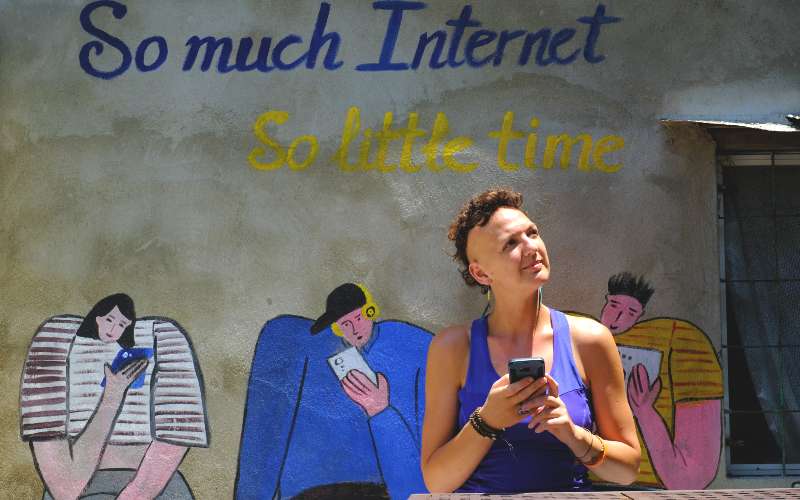
And sure, some people are glued to their phones constantly. Not to mention all the fear-mongering, cyber-bullying, shaming and trolling that goes on.
But then there are the groups that welcome you with open arms. Resources that help you cope with anxiety. Safe spaces to be found – if you know where to look for them.
So in this post, I focus on the positive side of online, particularly social media. The benefits of it now, during a global crisis, and years back, when I was going through the personal crisis of braving a bald head.
Even if you don’t have alopecia, hopefully you’ll get a lot out of this post. Because its key takeaway is universal, and timeless: a problem shared is a problem halved. Or a problem split in a thousand different ways until there’s no problem left at all.
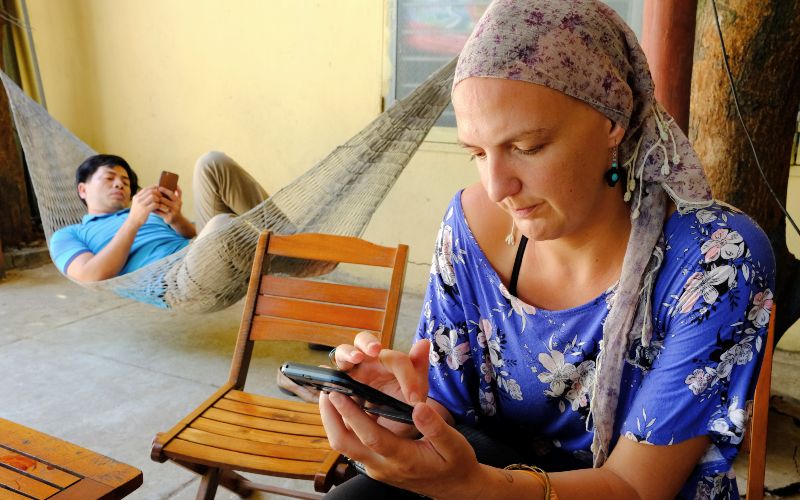
I noticed my first bald patch in pre-Google days, way back in 1997. I was 10. My mum had just died. So needless to say, hair loss was the least of my concerns.
But when I did start to care about my appearance, as I moved into my teens, I didn’t have anywhere to turn. A crinkly old doctor in a wrinkled coat told me it was alopecia. Blowing dust from his heavy reference journal (true story!), he diagnosed and dismissed me in about five minutes. “It’s stress-related. So try not to worry.”
I was back out on the street with no knowledge of safe treatments, fast-expanding patches and an even faster diminishing self-esteem.
With no one to talk to, I remained in the dark about alopecia for a long time. And we all saw, during the pandemic, what happens when you don’t know the extent of an illness, or how bad it’ll get – panic kicks in.
It felt impossible to speak up, even if I’d had the opportunity. Because I felt like a freak. No one I knew had what I had. (Not that I was aware of, anyway.) So how could I talk about something that no listener could understand?
It was safer to hide, to keep my mouth shut and to trap my anxieties in.

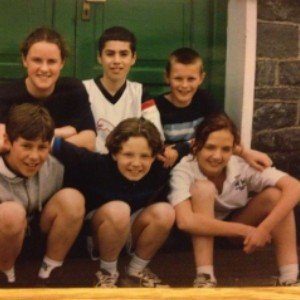

With no resources connecting me with others who had the same thing, I felt lost. I thought I was vain, selfish, even crazy to be that upset about hair loss.
Why did it affect me so much? I was ashamed to think that I was breaking myself in some way, and I didn’t know why. And I felt guilty. Guilty because every time I didn’t tell someone what was happening, I was telling a lie.
At least, that’s what my teenage self believed – negative thought patterns which led to crippling self-doubt, self-destructive behaviours and years of spiralling depression.
I went to scores of doctors, dermatologists and trichologists – but I couldn’t make head nor tail of the jargon they used. And not one of them took the time to understand, or even to listen to, the emotional pain I felt. They prescribed me corticosteroid injections and cortisone creams and visits to psychologists, which I dutifully lapped up and continued to feel worse.
Luckily, I had my family, who were always supportive in telling me they loved me, and that it didn’t matter, I was beautiful in their eyes. But that wasn’t what I needed. What I needed was to see and hear from people like me, who could understand what a condition like alopecia can do to you – physically, mentally and emotionally. And it wasn’t until years later that I found it – in the unlikely territory of social media.
I won’t go through my full tale about ’fessing up to alopecia – if you want to read that, check out this post. But, long story short, a teary blog entry and a Facebook post marked my journey towards acceptance.
I’d just returned from a solo travel adventure with a freshly shaved head and a different perspective. But my new self was still tender, still bruisable, and I was scared to show her right away. I wore headscarves for my first few weeks at home until something made me want to share my story.
I don’t remember the exact moment but I do recall, as I wrote the post, how my fingers burned from typing so fast. I couldn’t spill it out fast enough. I paused only for a moment before sharing that blog post on Facebook and suddenly I couldn’t take it back. My story was out there in the online world and those distant judges, scattered across keyboards and IP addresses, were free to cast their vote.
Like so many cases of admitting vulnerability, the internet can raise you up or tear you down. Luckily, in my case, it was the former. The stream of messages, comments and emails I received over the next few days – from friends and strangers alike – floored me. I didn’t know until then that I’d been holding my breath… and finally, I could let it out.
Now, I had ventured into the online space before, of course, trying to find answers about alopecia. But the websites I found seemed to be cyber versions of that cranky old doctor: dry, stale information, no personality whatsoever. That’s how it was back then.
From what I could gather, there were no communities of alopecians online. No one who could understand. And even though that initial Facebook post was a form of catharsis, I wanted more. So I decided to create my own community.
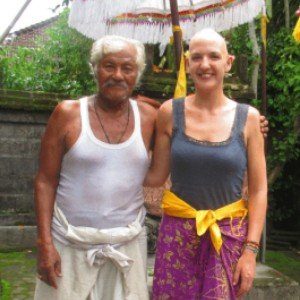
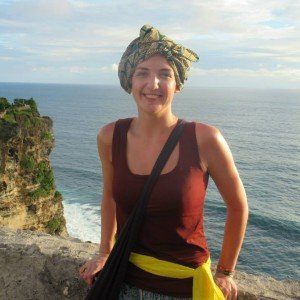
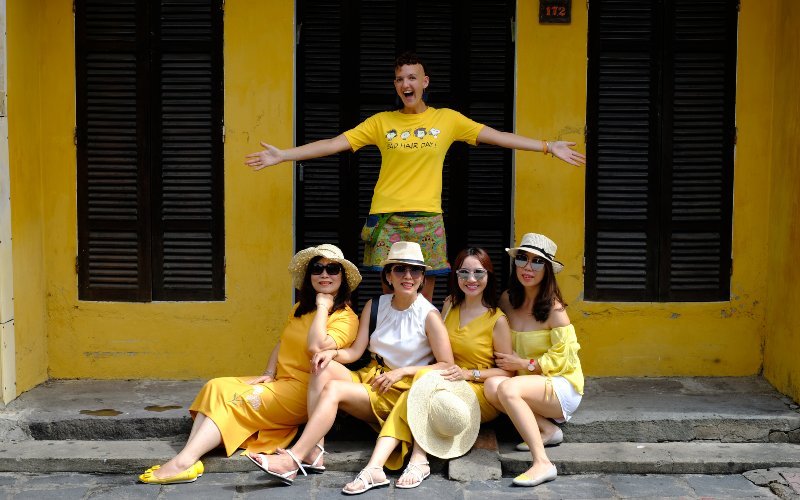
It took a few years but eventually, I realised it wasn’t enough for me to simply display my bald head in public, telling people I was ok with alopecia. I had to do it in a far more visible space.
Because maybe I could help other people who were going through the same anxieties that I’d had, not long before. After all, what did I have to lose? My hair?!
The great thing was, as soon as I started researching properly – having given up on hair loss websites years before – I realised that a bald revolution was already simmering quietly below the surface. I came across personal blogs, forums and community groups all talking about alopecia. Offering advice to each other, answering questions and, when there were no answers to give, providing support instead.
I was so excited to become a part of that space and to become Lady Alopecia: a public figure that could share information about hair loss, practical tips on staying healthy and personal anecdotes that would – hopefully – empower others to find joy in what makes them different.
I got invited to speak on podcasts, like this one with Steven Farrell and this one with Claire Bradshaw. And as I spoke openly about my alopecia, I learned that I’d more than come to terms with it – I was grateful for it. Grateful that it led me to those interactions, with amazing people who I wouldn’t have met otherwise.
But the biggest eye-opener came when I joined Instagram. Now, I’ve never been a social media butterfly – I’m more like a moth, zapped and depleted by its spotlight. The constant posting of breakfast snaps, “live your best life” quotes and “no-filter” selfies (which have clearly been filtered) have always exhausted me. So I steered clear of Instagram for a while, thinking it was only a place for showing off, for making others feel worse.
When I did peep my head into the Insta-scope, I was surprised and thrilled by what I found. The stuff that truly matters. Connection, empathy and support.
Instagram has connected me with a community of beautiful, badass baldies, all doing their thing. People who speak openly about their alopecia – not just the times they’re ok with it, but the times they’re far from ok, too.
I’ve laughed and cried at the stories of some amazing alopecians, like…
.
..to namecheck just a few!
They’ve taught me that social media doesn’t deserve all the bad press. Because, if you use it responsibly, it can be the very thing that sets you free.
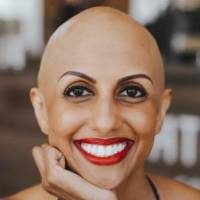
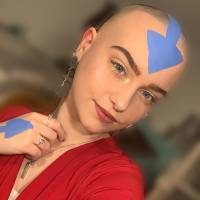
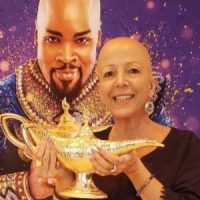
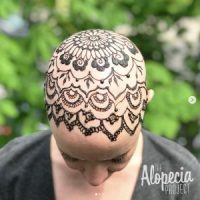
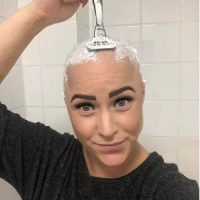
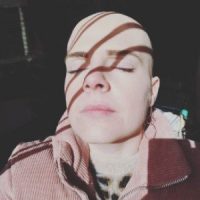
I’ve learned that not having brows or lashes means you sweat directly into your eyeballs. I’ve enjoyed A LOT of baldie puns. I’ve been inspired by Gianessa, an amazing 7-year-old who decorated her bald head with jewels to win “Crazy Hair Day” at school.
It’s thanks to this community of online alopecians that I, as Lady Alopecia, have been able to truly grow. To share my experiences and to keep learning from others.
I’ve come to realise how incredible social media can be – for connecting people who feel like they’re otherwise alone. Whether it’s an autoimmune condition like alopecia, a mental illness, or anything else that could isolate us, we can now easily find and learn from others going through the same thing.
2020, in particular, reminded me just how strong that connection between screens is. I had wine parties with my friends at home through Zoom. Watched my sister teach yoga on YouTube. Joined my friend’s meditation session on Facebook Live. And created the first-ever yoga for alopecia course, too.
And even though I still limit my news intake – so I don’t get swept up in panic or stress – I find comfort in the knowledge that we’re all here for each other, even when we’re apart.
Even if you’re an alopecian who isn’t ready to talk about it, that’s ok. You can still read about other people’s experiences.
Maybe you’ll learn something new. Or maybe you’ll feel better when you realise that alopecia’s more common than you think! Either way, you’re not alone.
In fact, we’re seeing more and more people in the public eye – from Ricki Lake to Jada Pinkett-Smith to Congresswoman Ayanna Pressley – talking about their alopecia online. And it’s giving others hope. And that’s an inspiring thing.
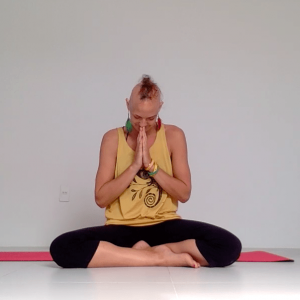
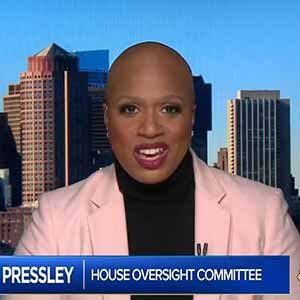
The more I’ve shared about my alopecia, the more comfortable I’ve become in my skin. (Considering how much shiny head skin I show, that can only be a good thing.)
It’s a lesson I think we can all benefit from, especially in these uncertain times. To share your experiences. To talk openly about your fears and insecurities. And to support each other. If you can’t get out and connect with your usual community – or if you don’t know whether one exists – trust me, you can find it online. That’s what I did.
I’m so grateful for each and every patchy head I’ve met. Thank you for giving this bald revolution momentum. I’ve lost my hair but I’ve found a community of other hair lossers – which to me, is far more valuable in the long run.
Over to you… have you found the online world to be supportive in terms of alopecia? Or have you experienced any negativity? How about the ways you're using the online space right now to cope with stress? Whatever your story, please share it below!

Liked this post? Then you might like these ones, too!
1. Female celebrities with alopecia – more ladies who rock their bald spots
2. Advantages of alopecia – the best parts of being bald
3. Alopecia diet tips – take care of your immune system, more important now than ever
4. Meditation for hair loss – tips to help you handle stress – of alopecia, or whatever else
5. Lessons to learn from Ayanna – More about Congresswoman Pressley
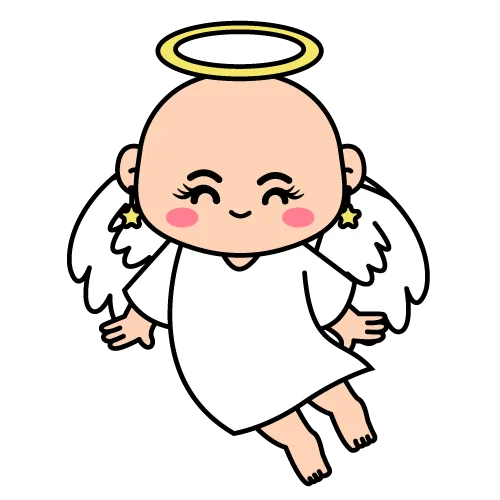
Every month, thousands with hair woes visit my site. The more the merrier! But it takes AGES to write posts and reply to emails. Don’t get me wrong, I love it! But running a website isn’t free. So I’m trying something new: I’m asking for your support. If Lady Alopecia has helped you, please consider buying me a (virtual) coffee or even become a patron of the site. Thanks!
I’m Emma. I’ve had alopecia for 24 years and I’m here to inform/hopefully empower people like me! Read my full story here. But I’m not a doctor, so any advice here is based on my own research and experience. I’m also in a few affiliate programs – see my disclaimer page for more. Or contact me here. Also, why not join a thousand fellow alopecians and get my-semi regular hair about life with irregular hair?
Psst… If no welcome email shows up, check your spam.
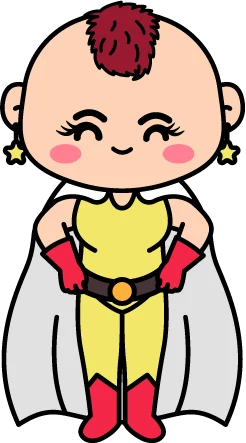
Small print time: Ladyalopecia.com is a participant in the Amazon Services LLC Associates Program, an affiliate program designed to provide a means for sites to earn advertising fees by advertising and linking to Amazon.com.
Copyright © 2023, Lady Alopecia. All rights reserved. Important – By using this website, you promise not to steal stuff. Thank you kindly.
Join the gang and receive semi-regular news and joy from someone with very irregular hair.
4 responses
Hello friend ☺️
So glad to have your post online and I’ve signed up to your newsletter also. I’ve suffered from alopecia since my early twenties, in my forties now. Being a black lady it was easier and socially acceptable to hide behind wigs and hair pieces, but I felt I was hiding and my self confidence wasn’t great. Recently I’ve gone bald, chopped it all off and learning to love and accept myself. So glad I’ve come across your post, happy to be part of a community of sisters going through the same thing!
Dear Ashley,
Thank you for your lovely message – I’m so glad this site and the wider community in general is helping you! I definitely found that opening up about my alopecia and meeting others going through the same thing has helped me feel less alone…and I totally get what you mean about feeling like you were ‘hiding’ under wigs. I know some people love them, and that’s perfect for them, but like yourself I felt so much better after chopping it all off! Well done to you, and keep doing your amazing, positive thing!!
Lots of love to you xxx
dear Lady Alopecia,
Thank you for being out in the world, trying to create a community and staying true to yourself. i know it is not always easy. to other women out there thank you. i am in the beginning of this. i really appreciate the road you are building.
giulietta k.
Hi Giuletta,
Thank you so, so much for your lovely comment. I really appreciate your kind words – this is really why I created Lady Alopecia, so we could all share and support each other. It’s been an incredible year and I’m so very grateful to people like you who remind me why I’m doing it! I’m actually setting up a Facebook page and private group this week…the page will be called Lady Alopecia so stay tuned! And look forward to welcoming you to that community, also. 😉 In the meantime, feel free to sign up to my newsletter (in the footer)…I wish you all the very best in your journey and remember, a community is always here for you! xo